#also i love the implication that Hero is getting a new car everyday
Note
Maybe you could write something hero villain where the villain has been leaving sweet gifts for the hero for a while but hero thinks it’s just a secret admirer! Love ur writing !
1.) "It- it was you all along?" A flurry of emotions hit the hero like a truck. "You..." they trailed off, unable to form another coherent sentence. Their mouth opened and closed again.
Mistaking confusion and surprise for disgust, the villain fled.
-
2.) "Another one? How rich is this secret admirer and how can I get one?"
Hero shrugged. "Dunno, but whoever it is must really hate Villain." They trailed a hand along their new car's trim. "Every time we fight I get something nice the next day."
-
3.)Roses, tulips, carnations and irises tumbled together in a flurry of colour. The mixed aromas hit the hero before they even saw the bouquet sticking out of their mailbox. A familiar white calling card poked from between the leaves.
"Hello again to you too." The hero muttered, pressing the flowers from the secret admirer against their nose.
Nausea hit them like a train. Their mind went blank and they stumbled, dropping the bouquet to the ground. Not...Not good. Strong arms wrapped around their torso. The last thing Hero saw was a blurry Villain smiling down on them before everything went dark.
#my writing#writing#hero#hero villain prompt#prompt#villain#creative writing#writing prompt#hero x villain#heroes and villains#prompts#kidnapping#new cars#angst#...i think the second prompt is closer to a sugar daddy situation...#also i love the implication that Hero is getting a new car everyday#villain probably: cars. cars are good. everyone likes cars. cars are a safe gift
288 notes
·
View notes
Text
Boy meets girl
I often pressed V for information on how she earned income but she would give conflicting answers about grants and scholarships until one day.... About 6 months after our first meeting, she finally tells me and IT. IS. NOT. GOOD. I was interviewing at a professional school when I receive the call, she's in trouble, BIG TROUBLE, and needs my help. She tells me she earns money by doing others' assignments for them. $200 to write a paper and $800 to complete an online class, usually a 100 level introductory course. She describes the method she uses to circumvent the ITs detection of others completing others assignment and how her client wasn't doing his part to copy/paste and submit from his own computer. He is failing the course and blames her. He threatens to turn her in. Her plan is to refund his money and wants me to 'follow him to see if he goes somewhere alone and take his phone' because that has all the evidence of their communications. HOLY SHIT! SHE WANTS ME TO COMMIT STRONG ARMED ROBBERY, a FELONY for her! I'm not going down for this or with her and I know nobody would believe me. ENTER: military experience - if there's no record, it didn't happen. So, I agree to help her, somehow, as soon as I return to town.
I go to V's dorm the next night and she shows me EVERYTHING. Her list of clients, their blackboard passwords, how she meets them, how she defends them during honor code violations, etc. So I tell her not to worry, I'll handle everything on the day she refunds his money. Relieved, she goes to bed but before she lays down I ask to use her computer for on assignment and she says "sure do whatever you want". In my state, if you let someone use your electronics, its called "having privilege" and anything you do with their computer which may harm them is legal as if it your own computer. So, I took screenshots of her conversations with her clients, I open google settings and screenshot all the blackboard users and passwords stored on her computer. I go to her messenger and screenshot their conversations. Back home, I compiled our recordings and saved our facebook conversations. A week later, I made up an argument about an upcoming New Years Party and broke up with her. Then sat on the information I had on hand for 2 more weeks thinking about what I should do.
I remembered how she has a history of arrests from high school to freshman year for stealing from outlet malls and selling their loot online. Never formally charged. She, of course, omitted this from her application into professional school. How she admitted "finding a mark" and using them to pass her courses. How she denigrated others who were completing courses through hard work. How she used her position as honor council to get her friends out of trouble while helping to expel others for doing exactly what she was doing. How she cheated on me multiple times, used me, manipulated me, tried to make me commit a felony and ruin my life. SHE HAD TO BE STOPPED.
Knowing she was friends with the faculty on the honor council, they often bought each other gifts, I had to go above their heads. I gave names and descriptions of the events to my program director. He then goes to the honor council, anyway. I was called into the honor council's head office of "Corrupt Administrator" CA. CA tells me I should delete the information I have because it could become a civil matter and I should consider my "self preservation." She schedules another meeting with me a week later. I return and she asks if I want to make a statement about V. Guess what I said, I tell her "no, I deleted everything and I don't remember" because I was in the military and I know how to 'play ball' when superiors tell you to shut your mouth. But the most important reason I decided to not file against V directly was due to the fact I was applying for a military scholarship to pay for professional school. Since I did not follow through, the program director filed an honor code violation complaint against V on a date [suggested by CA]. A month later they tell me their investigation was inconclusive and they will close the case due to the director waiting 1 day too long to file according to the school's academic policy. CA set us up! However, since the director used my name as a source, they must notify V because students have rights to know their accusers. FUCK.MY.LIFE. CA fucked me and ruined any chance for a case against V based on a technicality. Now I fear for my safety because V tried to get me to strong arm rob someone now I just implicated a dozen cheaters who have as much as her to lose.
CA schedules a meeting with V and tell her about an ongoing investigation and tells her she will be kept up-to-date. I know the investigation is over and now they are just doing formalities. V requests the information of the investigation and they promise to email it to her. V calls me for support even though we aren't together. She is crying and talking about killing herself. She tells me her dad had been paying for her college this whole time and starts coming clean with other lies. I feel bad and almost regret everything. Maybe she is not a sociopath, maybe she is really sorry. She stays at my house the next few days, I'm watching her trying to keep it together. THEN HER FUCKING CLIENTS START COMING TO MY HOUSE. She is still doing their assignments! She NEVER LEARNS!
Finally she gets the investigation info and there's my name. She calls me 130 times in 3 days, sends her friends to my classes to tell me to come to her house, finally I do. But I don't go into her room because she will trap me. She takes my phone so I can't record. She tries to get me to sign a paper saying I fabricated everything and its all false. I tell V, "They already closed the investigation, you wont get in any trouble why should I implicate myself and get in trouble? It wont solve anything!" And she pleads, "Do you still love me?" I shake my head and walk out. Two days later, police are waiting at my house to serve a 72 hour emergency protective order (EPO) commanding me to stay away from V. I know what she is up to. She is trying to get me to violate the protective order, discredit me, and send me to jail. Its very easy to lie to create one and lie to say it was violated.
NOW ITS NOT JUST REVENGE TIME, ITS WAR
Here's the plot twist: I never really deleted the files as I told CA. TYVM, Google drive.
After the 72 hours EPO expired, another EPO arrives which lasts two years but requires a court appearance. This is a huge problem because I am in the US Army reserves and it requires the handling of firearms which is illegal under an EPO. Her lawyer calls me and threatens me not to "participate in anymore investigations against her" and sends a paper tiger. I get a lawyer, lets name him "Folds like a lawn chair". He tells me "who will they believe: a pretty girl or you?" I fire him. Get a better lawyer, a trial lawyer, called "Miss Badass Esq." and prepare for war. Miss Badass requests a copy of V's EPO from the court. It essentially says I was blackmailing her, threatening to beat her up, and I broke into her room to steal incriminating information against her. All lies. I provide my lawyer the entire history of our relationship: 600 pages of facebook and text messages showing she is the aggressor, the abuser, in the relationship, phone call history, all the recordings and screenshots of her cheating ring. I make a poster sized chart of her room and the events that transpire there the day in question when she tried to trap me into signing a statement taking responsibility for her actions.
Courtdate: We made V and her lawyer look REALLY stupid. They were going with the 'pretty girl' strategy. But the dorm gave us records showing she was signing me in and out of her room, so it discredits the need to break in. The call logs: 130 times in 3 days and aggressive texts showed she wasn't actually afraid of me adn it was her, not me, being aggressive. And when he asked what I had to use to blackmail her, her lawyer said "just some tutoring papers" for which the judge said, "that doesn't sound like anything wrong. What power did that give him over you?" They had no response. My turn to speak, I explain how she tried to get me to rob a guy, how she wanted me to write a letter to take the blame, how she used her position as honor council chair to break state law and violate academic policy. And summarized we were only there because she wanted revenge on me. I watched V and her lawyer stutter and squirm uncomfortably under the judges questioning, case dismissed.
All that information I gathered to defend myself was not going to go to waste. I took it to a newly hired honor council investigator called "Meg" who had no affiliation with V. I told her what CA had done to defend V. A week later, I was told the by Meg there had been a meeting with the school police, the provost, their legal team, then the provost himself decided filed a complaint against V. I had to meet with the police to file a statement about V trying to recruit me to rob someone but other than that I was out of the loop. I later learned the results: V lost her her slot at that school's professional program, her program director yelled at her at the top of his lungs, "YOU WILL NEVER GO TO ********* SCHOOL, I KNOW ADMISSIONS AND I WILL SEE TO IT", she got expelled, her TWO degrees (biomedical engineering and biology with a minor in chemistry) were withheld for 6 years and her transcripts would carry a permanent mention of an honor code violation, her clients who graduated had their degrees retracted with similar mentions on their transcripts, and current clients were also expelled. The school changed its policy on reporting date requirements to like 60 or 90 days. Me? I am in professional school. V had her chance to get away with all of this until she tried to get revenge on me. I reduced this super villain from owning a fleet of beta male minions, being the most connected person in the university, and having a lucrative future in ripping people off in the medical industry to the last time I saw her: riding a fucking scooter.
(source) story by (/u/Apophis1942)
573 notes
·
View notes
Text
Tal Pai, Tal Filho
A write-up and discussion on the new Lúcio story revelations, interactions between Lúcio, Symmetra, and Doomfist, and Vishkar’s role in Talon and the larger world of Overwatch, and speculation on Sanjay Korpal
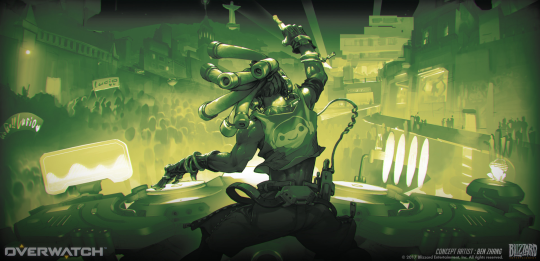
Mercy: Lúcio, I never realized your father was the one who made Vishkar’s sonic technology!
Lúcio: The core tech was his life’s work, owned and patented by Vishkar...but it’s mine now.
(Note: in another post, I incorrectly wrote “core tech” as “cortex” whoops)
---
Lúcio: Vishkar’s using you - just like they used my father! ...You just wait - you’ll see.
Symmetra: Your father was a Vishkar employee. He understood our company’s vision...a shame he never educated you.
---
Doomfist: Symmetra, I am familiar with your work. I look forward to seeing it in person.
Symmetra: My purpose is to create order. You are the embodiment of chaos.
---
Symmetra: Doomfist, you are mistaken - only with order can humanity evolve!
Doomfist: Order...chaos... means to an end.
Important to this discussion: a review of the companies and corporations in the world of Overwatch. A major thematic element in Overwatch’s story - and an increasingly large plot point - is the back-and-forth discussion on if a megacompany or megacorporation can ever truly be ethical (on the large scale), and how their actions affect individuals (for example, Satya Vaswani in Vishkar, or Fareeha Amari in Helix). Almost every known company and corporation in Overwatch engages in (or is implied to engage in) unethical actions, either for profits or to protect corporate secrets.
The Sombra ARG focused very heavily on LumériCo, and while LumériCo will never be completely “irrelevant” to the plot or world of Overwatch, two other companies - Helix Securities and the Vishkar Corporation - have “taken over” as more active elements in the immediate plot. Vishkar directly has ties to the Talon organization, through Sanjay Korpal:
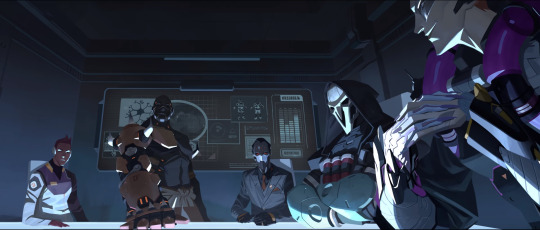
Now, we don’t know if Sanjay is present in Talon for his own personal interests, or if he is “representing” Vishkar in some sort of capacity. However, he consistently wears his Vishkar uniform, which means he either doesn’t care that other Talon members recognize which company he works for, or his association with Vishkar is more important than a sense of “personal style” (which is...actually saying a lot for a Talon member, lol).
Vishkar has always been a major player in two characters’ lives: Satya Vaswani (Symmetra), who is employed by Vishkar as a “hard light architech” (spelled correctly, lol) and who works directly under Sanjay’s management, and Lúcio Correia dos Santos, a musician-turned-freedom fighter who “stole” the Sonic Amplifier and hard light skates from Vishkar’s new building in Rio de Janeiro and used them to rally members of his neighborhood to drive Vishkar out.
Several massive revelations about Lúcio, Symmetra, Vishkar, and Talon were dropped in the May 22, 2018 update to Overwatch. You can find the majority of the new voicelines here.
(More under the cut!)
Legacy of Light and Sound
Vishkar is consistently described as a megacorporation, but it is far, far more than that. On the surface, Vishkar specializes in rapid, advanced construction of large buildings or even whole cities - they use a technology they call “hard light” which can (apparently) weave solid or semi-solid material from light.

However, what we know from both Symmetra’s Hero Profile and her comic is that hard light technology is extremely difficult to use, and “architech” require advanced training to use it.
Following the Omnic Crisis, the Vishkar Corporation of southern India began the laborious process of creating new, self-sustaining cities to house the nation's displaced population. One such city, Utopaea, was created using radical hard-light technology that enabled its architechs to shape the city's streets, utilities, and living spaces in the blink of an eye.
After she was identified as one of the few capable of becoming a light-bending architech, young Satya Vaswani was plucked from extreme poverty and placed in the care of Vishkar's architech academy, never to return home. Isolated and lonely in her new life, Satya immersed herself in her education and training. She quickly grasped the applications of the technology and was one of the top students in her class. Satya approached hard-light manipulation differently than her peers, with their more procedural, mechanical constructions, instead weaving her constructs in the motions of the traditional dance of her homeland.
However, reading between the lines, we can see that Vishkar is already unethical and outright dangerous here, as they blur the boundaries between education and child labor, and corporate loyalty and potential brainwashing.
Described in Lúcio’s Hero Profile, we learn that Vishkar imposes “control and order” wherever it goes and wherever it builds:
But Lúcio's close-knit community was thrown into chaos when the multinational Vishkar Corporation secured a contract to redevelop large tracts of the city. Lúcio and his neighbors had been told that the development would improve their lives. However, that promise never became a reality. Vishkar imposed controls on the residents in the name of building a more orderly society: enforcing curfews, cracking down on what the company perceived as lawless behavior, and exploiting the populace as a cheap labor force.
Extreme “loyalty”, militant control, unethical exploitation of work, and of course -

A ruthlessness to destroy all competition, even to the point of harming innocent bystanders.
It is under this intense “corporate culture” that Lúcio’s father worked for Vishkar.
We don’t know when Lúcio’s father began working for the company, though at bare minimum, it had to be after the Omnic Crisis ended. And until it is canonically stated otherwise, I will interpret Lúcio’s father as also being a Brazilian citizen, and a resident of Rio de Janeiro. At the very least, Lúcio’s Hero Profile stated that he “grew up” in the city, and loves his community. However, it is possible that Lúcio’s father either left Rio de Janeiro to live in Utopaea full-time, or that he made frequent trips. It is also possible that he rarely left the city, and did live with Lúcio while he worked for Vishkar.
Lúcio: Vishkar’s using you - just like they used my father! ...You just wait - you’ll see.
Symmetra: Your father was a Vishkar employee. He understood our company’s vision...a shame he never educated you.
At the very least, it sounds like Lúcio feels like Vishkar used - and then possibly abandoned - his father, while taking credit for his father’s work. He also believes that Vishkar will abandon employees or workers when it no longer finds them useful. Symmetra, meanwhile, states that Lúcio’s father knew the company’s values and visions, lowkey implying that he knew what he was getting into and what sacrifices he would have to make (much like her own, perhaps?) to uphold those.
Again, it is a question of loyalty and commitment to the company versus brainwashing or intellectual theft, as well as who deserves “the recognition” for “doing the real work” - a parallel we see consistently across the Overwatch universe (from Overwatch and Blackwatch, to scientific experimentation and ethics, to Omnics and robotics, even to Talon itself).
Lúcio is clearly in favor of crediting “the individual” over “the collective” (which is interesting, considering how he is also extremely community-oriented), or perhaps it would be better stated as he values individual agency and recognition of that, especially when it is willingly used for a greater good (again, an interesting point considering that Symmetra believes she is doing exactly that). He appears to believe that his father’s work is being misused, and therefore, he is in the right for “reclaiming it” for himself.
Mercy: Lúcio, I never realized your father was the one who made Vishkar’s sonic technology!
Lúcio: The core tech was his life’s work, owned and patented by Vishkar...but it’s mine now.
Important in Lúcio’s Hero Profile is the implication that his father’s work is being abused in a way his father would not have wanted (or did not design it for):
Lúcio wouldn't stand for it. He stole Vishkar sonic technology that had been used to suppress the people, and he converted it into a tool to rally them to action.
We have seen this concept of an “inherited legacy” several times in Overwatch: arguably, it is one of the more important thematic elements.

(Excerpt from “A Clash of Kings” and the discussion on “legacies”)
From Ana to Pharah and Widowmaker, to Torbjörn and Brigitte and Bastion, to Sojiro and Hanzo and Genji, to “The Savior” Doomfist to “The Scourge” and “The Successor”:
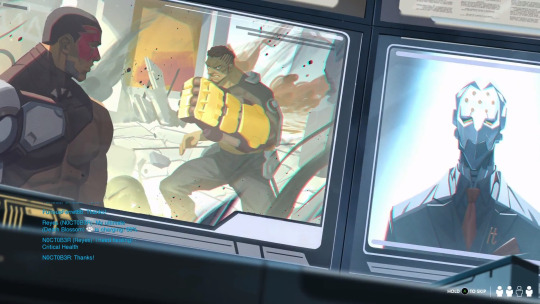
Arguably, even to Jack Morrison and Winston and Tracer:
Soldier: 76: Think you can do my job, do you...?
Winston: Someone has to.
Inherited “legacies” versus “true legacies” is a recurring motif, and Lúcio and Symmetra add a new “plotline” to it for us to consider:
Who is the one who “truly” inherits the legacy of light and sound?
Satya Vaswani is talented, accomplished, and innovative in her ability to weave hard light. Arguably, she is an “artist”, a master of her trade, just like Torb and Brigitte in engineering, or Ana and Widowmaker in sniping. For the time being, Symmetra embodies Vishkar’s “public” vision: a world where order is aligned, perfectly symmetrical, everything in its place.
If there is anyone who is going to “perfect” hard light technology and all its potential, it is her.
...Right?
Synesthesia is a perceptual phenomenon in which stimulation of one sensory or cognitive pathway leads to automatic, involuntary experiences in a second sensory or cognitive pathway. People who report a lifelong history of such experiences are known as synesthetes.
Another common form of synesthesia is the association of sounds with colors. For some, everyday sounds such as doors opening, cars honking, or people talking can trigger seeing colors. For others, colors are triggered when musical notes or keys are being played. People with synesthesia related to music may also have perfect pitch because their ability to see/hear colors aids them in identifying notes or keys.
(Source: Wikipedia page on Synesthesia)

“Synaesthesia Auditiva” directly translates to “Auditory Synesthesia” in English.
In an in-universe article, Lúcio describes his work:
Synaesthesia's positive early reception has delighted Lúcio, but he's even more interested in what people will think of his tour. "I've spent two years working on new technology for the show. It'll bring the music to life. You're going to do more than just listen to it," Lúcio said. "You're going to feel it. See it."
While it has never been officially confirmed in canon, it is implied that Lúcio is a synesthete - specifically, that he has chromesthesia, or a version where he can “see sounds” and “hear colors” (though many synesthetes will say that making a distinction between the two is effectively impossible, as their sensory perception of both is immediately linked).
This raises a few very important questions:
Why was an employee of Vishkar (a company specializing in light technology) working on sonic - sound-based - technology?
And what did he hope to accomplish with it?
Was it specifically for Vishkar to use?
Or was he working on it for a more...personal legacy?
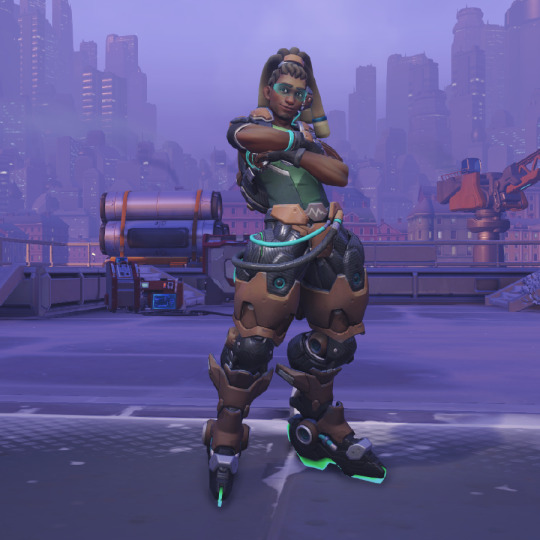
For his son, who could see music and hear light?
Mercy: Lúcio, I never realized your father was the one who made Vishkar’s sonic technology!
Lúcio: The core tech was his life’s work, owned and patented by Vishkar...but it’s mine now.
Lúcio’s synesthesia and his knowledge of his father’s core technology could potentially explain why someone without extensive “architech training” is able to use the hard light skates and Sonic Amplifier in a relatively short time after “acquiring” them.
Symmetra believes that she and Lúcio’s father represented Vishkar’s vision.
But Lúcio
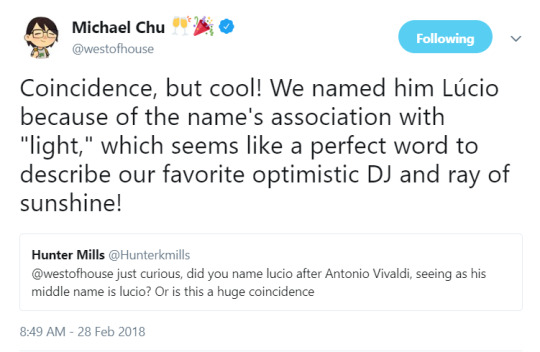
Represents “light” itself.
(source)
Arguably, Lúcio does not “see” a difference between light and sound, and similarly, he does not “see” a distinction between his father’s work and his father’s legacy. In fact, I think it is very interesting that Vishkar’s biggest “threat” to their “vision” isn’t Overwatch, or Blackwatch, or Talon, or anything else.
It is an artist who can “see” them for what they really are.
And who has the ability and perception to use their “tools” against them.
Not only does the revelation about Lúcio’s father tie him closer to Vishkar on a personal level, but it also brings him much closer to the main “plot” of Overwatch. As one of the few people - or perhaps the only person - capable of fighting Vishkar on “asymmetric” terms (a massive corporation versus a community rallied by a single hero), Lúcio’s abilities, perceptions, and his innate power could potentially make him a great “player” against Vishkar’s vision.
And against Talon’s.
Visions of (Dis)Order

Again, we don’t know for certain if Sanjay is in Talon as a representative of Vishkar, or if he is there for his own personal reasons, but in “A Better World” he espouses an ideology that is...extreme, to put it “lightly.”
Sanjay argues that “the greater order” is all that matters, that if destruction and chaos are means to producing “rebirth and growth,” then using them as tools to that end is acceptable - a concept which Satya finds...disconcerting.
Initially, this ideology and vision for the world appeared at odds with Akande’s, whose mantra is “Only through conflict do we evolve.”
After all, Akande’s “grander vision” involves pushing the world towards a global conflict which will force humanity to “rise or die.”

Ages ago - before the “Masquerade” comic came out, actually - I wrote an essay that argued that “Doomfist” was not merely a “title” handed down from gauntlet-bearer to gauntlet-bearer. Instead, it represented a lineage.
A legacy.
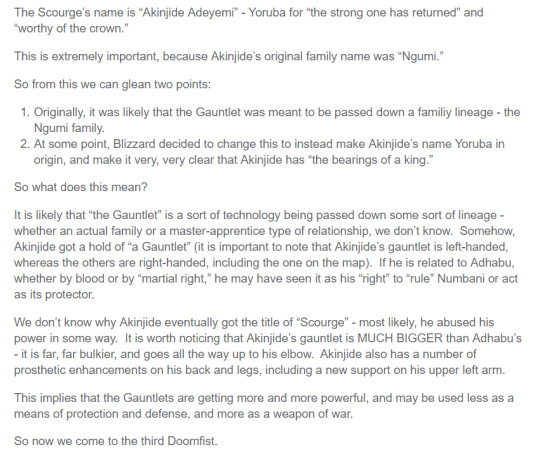
Now, this is something I wanted to elaborate on in another essay, but it is extremely relevant to this discussion on Lúcio and legacies.
Akande is a male Yoruba name meaning "firstborn." Ogun is a Yoruba god of war and metalwork, and dimu is Yoruba for "grasping." Akande Ogundimu can therefore be roughly translated as, "heir to the god who grasps iron and war," likely referring to his role as Akinjide Adeyemi's successor.
Akande’s name and his title, “The Successor”, appear to refer to him as the inheritor of Akinjide’s (The Scourge’s) legacy. And of course, described above, Akinjide’s name implies his royality, his regality.
But is that the “legacy” Akande wants?
Soon after the events of “Retribution”, we see that Akande squares off against Akinjide:
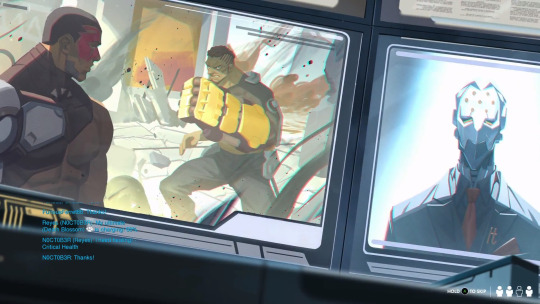
And - like Lúcio - this leads to an interesting question:
Who is the “Doomfist” who truly inherited the “legacy” of the first (“The Savior”) - Akinjide, a man who was “content to profit from raids on Numbani”, or Akande, a “commander” to saw a much greater potential - a grander vision - for Talon?
...And for the world?
Adeyemi was a useful asset to Talon, but the organization saw far greater potential in Ogundimu, with his intelligence and his ability to inspire as a commander. While Adeyemi was content to profit from raids on Numbani, Ogundimu had a grander vision. This difference in aspiration would lead Ogundimu to kill his teacher and take on the mantle of Doomfist, along with the eponymous gauntlet.
It was Akande.
It is not a coincidence that his Hero Profile has language that mirrors Sanjay’s dialogue in “A Better World.”
After all, Sanjay believes in Akande’s vision.
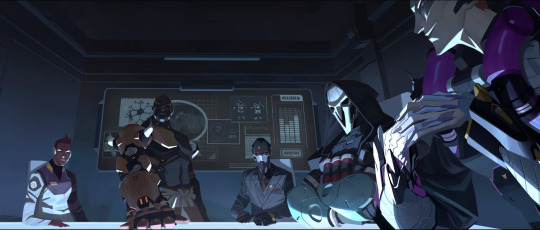
(Or he does for now, at least.)
And that makes one of the new Doomfist-Symmetra lines very important:
Symmetra: Doomfist, you are mistaken - only with order can humanity evolve!
Doomfist: Order...chaos... means to an end.
For the first time, Akande has expressed that - if he had to - he would use “order” (just as he uses “chaos” and “conflict”) as a means to an end: to create war, and to simulate the development of human technology and “progress” however he needs to. We can see very clearly how Akande and Sanjay can, in fact, share the same “vision”, where one of them “creates chaos” while the other can “impose order” to push-and-pull the future of the world towards their goals. Talon acts as a destabilizing and conflicting agent, creating chaos and disorder, and Vishkar can sweep in to pick up the pieces and rearrange them into a new “order,” one that is very rigid, controlled, and oppressive.
But there’s possibly another element to it.
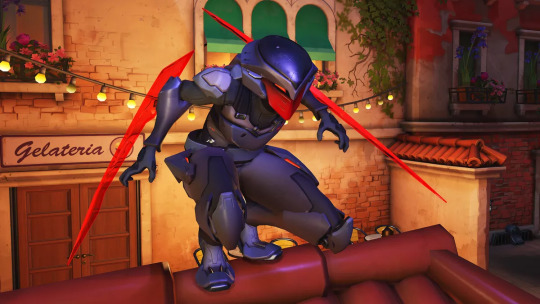
Oh man.
Y’all don’t even know how excited I am to have it confirmed that the tech developed by Lúcio’s father was held by Vishkar before he reclaimed it.
In fact, I really thought I was going to have to hypothesize and argue tooth and nail for the “the Assassin uses hard light technology” theory.
But then these interactions came out and I’m ready.
“Assassin”: Like the enforcers, Talon’s assassins possess enhanced speed, stealth, and balance and have proven extremely elusive, as their movements are near impossible to track.
You remember those essay drafts I said I wasn’t very happy with? Well, I already had most of this written.
The Assassin (gif of the Assassin gameplay: https://gfycat.com/LongGleefulBullfrog)
(We’re getting deep into speculation territory here. Super deep. Remember, I can only provide you the evidence that we currently have and help argue about hypothetical conclusions here - these can easily be confirmed or denied by later story revelations.)
I know a lot of people were confused by my “quick remark” that the Talon Assassin uses Blink/Recall. A lot of people argued (reasonably, in my opinion) that the Assassin has more in common with Genji: a “dash”, along with wall-climb, “blades,” and a very “ninja-like” stance, posture, and figure. I agree that the Assassin being a highly-trained cyborg, possibly based on Genji’s cybernetics, is actually very plausible.

Originally, I wrote that I thought the Assassin might have been using a variation of “Blink/Recall” - a prototype of teleporting technology which Vishkar could have supplied Talon (and one that was too “experimental” because it hurt the Assassin to use).
However, a more...intriguing hypothesis (to me at least) is that the Assassin uses a different sort of technology:
One which has the ability to make strong, “glasslike” material objects

Which also has the ability to teleport
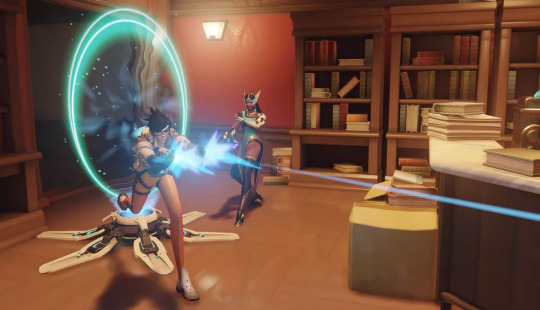
Which also has the ability to wall “climb”.
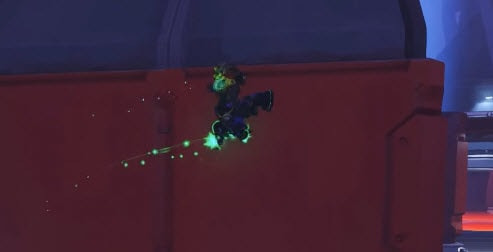
When a Korean hacker managed to “unlock” the Assassin and use the character/model in actual gameplay, the “teleporting” ability isn’t present - but neither is “Genji’s dash.”
https://youtu.be/pQxvSjeYtfk?t=31 (time: 30 seconds)
In fact, what was “playable” was a character/model who appeared to move at a high “speed” and could easily cling to or “ride” walls.
Now, it’s hard to say how canon the gameplay is. And the hacked Assassin “hero” barely seems to function as a fully-playable character. Her title and her “blades” make her much more comparable to Genji than Lúcio, so I won’t disregard the argument that she’s meant to be more like him, a cyborg ninja, than Lúcio, a musician-freedom-fighter.
However, now that we know that Lúcio is intimately tied to a branch of Vishkar’s technology - one which is all about speed, sound, and light - and that Lúcio’s father directly contributed to the core technology that enabled his Sonic Amplifier and hard light skates, it seems significantly more plausible that the same technology made the Assassin. Though we do not know for certain that Sanjay Korpal was a part of Talon at the time of Retribution, there are names “redacted” on one of the memos still.
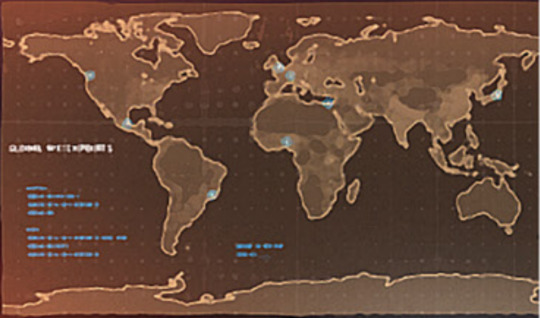
It is also important that - following the event of Retribution - Overwatch investigates an “active threat” in Rio de Janeiro, years before Vishkar formally “moves in” to the city.

We know from Moira’s Origin Video that Overwatch would investigate scientists and engineers that in considered unethical.

If Overwatch traced parts of Talon’s equipment and technology to Lúcio’s father (who may or may not have had any idea of how his tech was being used by Vishkar > Sanjay > Talon), then yes, it seems plausible that they were investigating him and his work. We also know that the man who embodied Overwatch itself has a deep distrust of companies and corporations, even in the present-day story:
Soldier: 76: I wanna know what LumériCo's been up to.
Also in the present-day story, Sombra - another character who appears to distrust and dislike corporations - has linked LumériCo to:
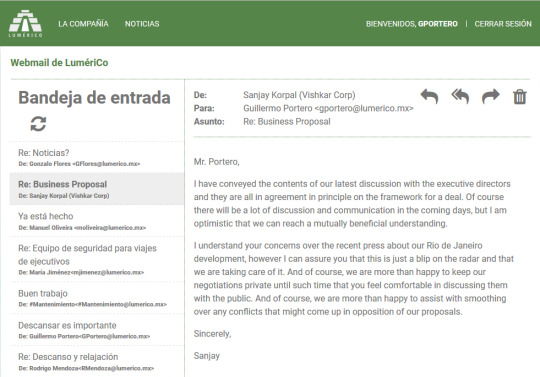
And if you buy the theory that Sombra and Reaper are working together to infiltrate Talon, that makes the fact that they both know how corrupt Sanjay is, and how he might have misused and weaponized a technology that was supposed to help people with light and sound...

It makes their role in Talon that much more interesting.
Where will Lúcio go? What will he do? What will he accomplish? He is very clearly sympathetic towards characters like Winston, Tracer, Orisa, and D.Va - “heroic” characters who are fighting for justice and hope - but if Sombra holds information that Lúcio is interested in (his father’s work, Vishkar’s unethical decisions, Sanjay’s corruption), what could she persuade him to do?
And...what could she “reveal” to Symmetra?
Could she change her mind the way she did with Zarya?
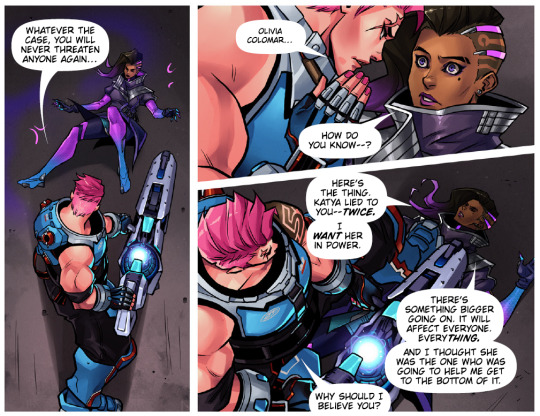
But more than Sombra influencing other characters -
What will happen when Symmetra finds out that her illusions aren’t real?
Doomfist: Symmetra, I am familiar with your work. I look forward to seeing it in person.
Symmetra: My purpose is to create order. You are the embodiment of chaos.
What will she do when she realizes the legacy she thought she was embodying is a lie?
There are so many possible different directions for this plotline to take - all of them very exciting and very intriguing. Lúcio and Symmetra are being woven deeper into the core story of Overwatch, and the decisions they will make in the future could have profound repercussions. It’s not necessarily about who is “right” and who is “wrong,” but rather a discussion of...perception.
That is...
Unless another character decides to take matters into his own hands.
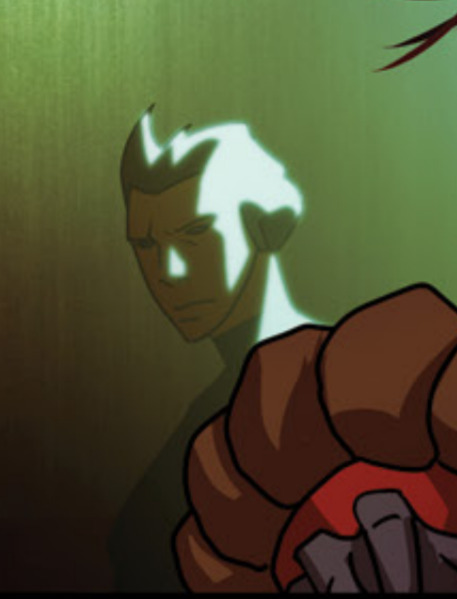
He could step out of the shadows

And into the spotlight.
(Source)
And with Symmetra getting a major gameplay rework in the near future, it might be time to explore what else hard light technology - and hard light tech users - are capable of doing.
#lucio#lucio correia dos santos#symmetra#satya vaswani#doomfist#akande ogundimu#overwatch#overwatch lore#overwatch theory#sanjay korpal#vishkar#talon#resources#references#my writing#my essays#gooooood i'm so excited#i've been ready for this plotline to take off#and now its finally getting some more details#lucio is one of my favorite characters in overwatch and I'm so happy to see him get more story#and the doomfist symmetra interactions are so good#if/when they make sanjay a playable character i'm ready to fight him over and over
303 notes
·
View notes
Text
Hello and welcome to my very strange world of vampires.
Please love my children (all of the characters are mine except for Hero and Mike, whom belong to the ever lovely @arebeesreal )
Original Vampire: Eternals
Half-Human Half-Vampire: Youngbloods
3rd Generation and On of OV blood: Undead
Half-Vampire Half-Werewolf: Leeches
Half-Werewolf Half-Vampire: Rejects
Ariella, Bernado, Caleb and Simone (the only 4 currently known) as Eternals.
Athena and Juniper: Youngbloods
Scott, Elisa, Daniel, Elliot, Giselle, Avery, Killian, and Emma: Undead
Seb: Leeches
Hero, Mike: Rejects
Eternals being the Original Vampires within the 1st and 2nd generation have most of the powers and weaknesses that come with being an OV. However,
Ariella is the only one capable of true power after feasting on blood due to being the very first Eternal. Bernado, Simone and Caleb having been turned by Ariella create the 2nd generation of Eternals, which then become known as the Undead once the 3rd generation begins.
In the 2nd generation of Eternals, Simone, Caleb and Bernado each old the capability of yielding the same powers as Ariella, but not as strong or as frequently. Simone uses hers primarily to control the minds of others with commands and compelling. Bernado influences the emotions around him and uses his alluring odor to reel in victims and Caleb stays out of the spotlight and keeps to himself. Unlike the other 2 Eternals, he doesn’t use his powers for bad. Likewise, Ariella stays mostly hidden and no longer uses her powers for bad after seeing what she’s done in turning Simone and Bernado.
Downsides to being an Eternal is that they can’t go outside in the sunlight at all. Most of the time, they sleep underground to avoid the discomfort the sun brings even when shielded inside of a house without windows. They must feed every night, so they often hunt during the night. If they go more than 2 days without feeding, they will gain an uncontrollable thirst and end up attacking anyone in sight until they’re satisfied, which can potentially lead to a blood-crazed killing spree that was later adopted as blood lust.
Youngbloods are half-human, half-vampire created offspring. This can be done either in pregnancy (which is only capable in OV tainted blood) or when a half-human, half-vampire turns someone. The outcome will always be the same as the original in this case. There are a lot of perks of being a Youngblood, some of which is the ability to go outside in the sunlight without trouble. There may be a little bit of discomfort, but no pain or risk. Youngbloods don’t need to feed on blood to survive, although feeding on blood can make them heal faster if there is a wound, or can make them feel stronger. They still gain the advantages of being a vampire; faster than a human, stronger than a human, better senses. However, they have all the weaknesses of a human. Being hit by a car hard enough can kill them. They can get sick and diseases that can’t be healed by drinking blood.
Youngbloods also don’t gain special powers. They can’t drink blood and be able to command others or compel anyone. They’re humans with limited vampire perks.
Undeads are 3rd generation and on of Eternals. These are vampires with OV blood in them that, as it’s passed down to future generations, becomes smaller and smaller and changes until it’s no longer OV blood. By then, we are unsure of what these vampires will become, or what they’ll be capable of. However, 3rd generation undeads are each given a specific ability in which they can use.
These powers have grown and changed and expanded since the first Eternal, making it possible for new powers to be unleashed, such as Avery, who has the power of bio-luminescence whenever she is in water. Elliot has the ability to sense those around him, unable to pinpoint exactly where, but when searching for someone, is able to find the general area. Emma can manipulate people through emotions, much like an Eternal, but less strong.
There are many still unknown (mostly because I haven’t come up with them yet) that are being discovered everyday.
Two new types of vampires have arised, Leeches and Rejects. These are different despite sounding the same because a half-vampire half-werewolf and a half-werewolf half-vampire implicates that the first part of this type is what the creature was originally.
For example, Sebastian was an Undead before he was a Leech. He was a 3rd generation Undead until he was turned by his werewolf soulmate.
Likewise, Hero and Mike were both Werewolves before they were Rejects. They were turned by Sebastian to become a vampire.
Because Werewolves aren’t immortal, there is a justifiable reason to be turned by a vampire to reach that immortality, however, it’s uncertain why a vampire would want to be bitten by a werewolf to gain werewolf abilities and weaknesses.
That said, Leeches, despite being half-werewolf, still must drink blood to survive and have all of their vampire powers and weaknesses. In addition to that, they then gain the weaknesses of being a werewolf, as well as the ears and tail of being one. Even with the new werewolf part of them, Leeches still must drink before going outside in the sun. It’s not certain what sort of benefits one gains from becoming half-werewolf.
Rejects, apart from gaining the immortality of a vampire, do not gain any other bonuses from being a vampire. The canines they have from being a werewolf can aid them if they should want to drink blood, but because they were first a werewolf, they only need raw meat to survive. Like the Leeches, they do gain the weaknesses of a vampire besides being incapable of going outside without drinking.
There are more types of vampires still to be discovered and will soon have names and explanations for those curious about their nature.
3 notes
·
View notes
Text
What’s the cost...for others?
“And behold, a lawyer stood up to put him [Jesus] to the test, saying, “Teacher, what shall I do to inherit eternal life?” He said to him, “What is written in the Law? How do you read it?” And he answered, “You shall love the Lord your God with all your heart and with all your soul and with all your strength and with all your mind, and your neighbour as yourself” And he said to him, “You have answered correctly; do this, and you will live.” But he, desiring to justify himself, said to Jesus, “And who is my neighbour?” (Luke 10:25-29, ESV)
And so, Jesus responds with the parable of the Good Samaritan. Jesus’ point? You can’t choose who your neighbour is, who you think you should love. There are no limits to how and who we love. Jesus’ use of the Samaritan as the helper/hero in the parable gives his response extra ‘sting’: If Jesus had said that a Jewish leader helped a Samaritan (someone who was hated by the Jews) in his parable, then it already would have provoked the question-asker’s assumptions and sense of self-righteousness, but the fact that he flips it, and it is the Samaritan who helps the Jew...well, Jesus is saying something very provocative indeed! Ultimately, the right response from the question-asker should be falling to his knees and asking for God’s mercy. This is what Jesus was trying to elicit from him. He needed to surrender his understanding of what it means to love God and neighbour (and Jesus’ point here is the two are synonymous in action) and ask God to change Him.
Why do I share this? I think this is ultimately the basis for many of our consumer decisions! Perhaps you have never thought about this as a direct response of obedience. Let me explain. Who is our neighbour, according to Jesus? Is it my family? Yes. Is it the person next door? Yes. Is it the rude driver this morning? yes. Is it the homeless man on the corner of my walk to work? Yes. Is it the person who stitched the label onto my t-shirt? Yes. You see, Jesus’ point has huge implications for us. I’ve heard Christians say, and even teach from the pulpit, that we need to first love our families well, then we can love those outside. Hmmm. Yes, and no. Firstly, yes, in the sense that how we love our families is important and shows our true character and shapes the character of those who share a household with (this is why God gives it as a command in the Ten Commandments - the family is the bedrock of how society functions). Secondly, no, in the sense that, Jesus himself points us to see who is our family differently: Mark 3:21-35. In a similar stream of thought to His provocative parable in Luke 10, the Good Samaritan, Jesus challenges us to see that there should be no favouritism in how we prioritise people. Practically, that looks different for everyone, yes, because of different needs, but our motivations would reveal our hearts. If we give our biological families time and thought above others, those in our spiritual family as well as neighbours (and that means not just my immediate, “liked” neighbours, but also those who make my clothes and I know nothing about), then have we understood the new order of God’s kingdom, and live by it? (I’ll explore what this means for our hospitality in another post and what that looks like for our household.)
It does seem overwhelming, but again it is by the grace of God we are part of His family, His kingdom. We don’t have to earn our way in. But, as His kingdom people, we are hopefully growing in being His people.
One area I want to focus on, in this post, is how this looks in terms of loving those we have not met and will possibly never meet, at least on this side of the new creation. The impact we have on them, however, is great - we determine their livelihoods, their health, their children’s education and welfare, their opportunity to flourish. In another post, I’ll talk about how giving should reflect this love for neighbours unknown. But here, in particular, I want to bring attention to how spending should reflect this love for neighbours unknown.
One does not have to do much research to realise the exploitation and abuse of others in producing the common, everyday items in our homes, clothes in our wardrobes, food in our fridges and pantries, skin care products in our bathrooms. So a question that I now ask before I purchase anything: “Wow, okay, this is good for me (cost-wise, or specificity-wise, etc.) but what is the cost for others?” Some examples:
1. Mobile phones: Almost all phones run on lithium batteries which contain cobalt. Cobalt is mined in places like the Congo by children as young as seven, in very dangerous situations. It literally costs the lives of others, especially the most vulnerable. If we are loving neighbours as ourselves, would we love ourselves, our children this way? (You can read about it here: https://www.mining.com/web/new-cnn-investigation-finds-children-mining-cobalt-congo/; https://www.amnesty.org/en/latest/news/2016/01/Child-labour-behind-smart-phone-and-electric-car-batteries/)
What can I do? If you already have a phone, look after it, don’t upgrade every chance you can. Try to get it repaired. If it can no longer be repaired, look for brands/phones that have higher ethical standards in how they source their parts. There is a Swedish company that creates a very ethical phone (https://www.fairphone.com/en/our-goals/). The cost is high...for us. The phone is over $1000 (though apparently people are willing to pay such prices for the latest iPhone model), but they’ve created it so that its various parts can be replaced. You can even construct it from scratch according to your specifications. The cost might be high for us, but perhaps that is what you can pay to love another well.
2. Jeans: Distressed jeans are in fashion but did you know that the sand blasting process required to get them to look and be the way they are is very dangerous for the workers? Can cause partial blindness. Also, the resources required to manufacture jeans requires huge amounts of water.
What can I do? You’ll see the pattern start to emerge: if you already have jeans, look after them, don’t always get more and more pairs. Do you really need more? Get them repaired rather than throw the whole pair out if somewhere starts to wear thin. After all, we all love jeans the older they get. Buy second hand! Don’t just attack the fast fashion shelves. We are so used to consuming seasonally (my summer wardrobe, my winter wardrobe, my 2018 wardrobe...you get what I mean) that we just have too many clothes and throw out what we could continue to use. But if you do need to buy, seek out ‘slow fashion’ brands, like People Tree. (You can also type in the name of brands you buy or find and learn of their social and environmental impact: https://www.ethical.org.au/) Why are they so expensive!?” you might be thinking. That’s because we’re so used to paying unjustly little for our clothes that we don’t understand the real value that it costs and should cost in paying those who labour to make them to sustain their lives with dignity. Would you like to be paid 62 cents an hour to make jeans for greedy minority worlders (this is the average that corporations like Target, Big W and Myer pay to workers in Bangladesh)? You can also sign a petition and write to our clothing companies pressuring them to raise the wages they pay: https://actions.oxfam.org/australia/

3. Meat: There is much that can be said theologically and ecologically about how our meat is processed, and the welfare of the animals in the industry, but here I want to focus on our workers. Do you know someone personally who has worked in an abattoir (where they kill the animals and cut up meat)? I do. And I’ve also done some reading on the subject. The turnover of workers in this industry is extremely high. That’s why often they get, at least in Australia, those on temporary visas (e.g. working holiday) to do them. If you want to stay in the country, this is one way you can ensure that. But no one lasts very long. And studies have been done that show that those who leave have symptoms akin to PTSD. The way these workers are forced to treat the animals, the heavy lifting of carcasses, the long hours...all highlight what is wrong with this industry.
What can I do? This is a hard one, but easier than you think once you start. Food is such a habitual part of our lives. If we have grown up eating meat at every meal, it is hard to imagine what we would do instead. It is hard to change such ingrained habits. But I think it starts with consuming less meat. Perhaps once a day, and then aim for once a week. “What about my iron?” you might ask. There is a great myth that there is no better way to get iron than through red meat. Check out the chart here on the amount of iron you can get from plant based food: http://www.nutritionaustralia.org/national/resource/iron. As you can see, it’s very comparable. In fact, beans and lentils have higher concentrations of iron per gram than meat. If you do consume meat, consider paying more - buy from directly from farmers who kill their own animals and sell their animals whole to butchers, like Feather and Bone (https://featherandbone.com.au/). It might cost you more (financially, seeking out places), but it loves your neighbour. You can also find out more about where and how to buy ethical meats and food generally here: https://foodprint.org/
4. Beauty products (soap, liquid washes, face, hand, body creams, make-up): This is often an area that we don’t give much thought to, but this complicated industry exploits and abuses people and animals. Let’s take L’Oreal as our example. Again, you don’t have to do too many Google searches to find out what this company does in the process of making their products. They pay very low wages to workers in particular places of manufacture, they are known for cruel animal testing practices (it is again not difficult to find images and footages of what this involves), even though they claim to source palm oil responsibly, that has not been the case (you might know the devastation that the palm oil industry leaves for communities and wildlife).

What can I do? The beauty of this industry is the amount of alternatives that are available to us. There are brands which are very easy to find on supermarket selves, like Thank You and Biore. But there are also many franchises like Lush which you can find easily in many big shopping centres. There are also online alternatives that you can find on https://www.biome.com.au/ or https://www.floraandfauna.com.au/. What I love about these products is they are made with natural things! The only reason brands test on animals is because they are using harmful chemicals! There is also the bonus that they provide reusable containers or don’t wrap their products in plastic that can’t be reused. Again, sometimes (and actually not always, given what big brands charge for their beauty products) they cost more from us (time and money) but do our choices and decisions in all areas of life reflect our love for God and neighbour, our reverence for Him as our Creator and the Creator of other people and living things? An indecision (or lack of change given what we know) is also a decision.
I want to end with Colossians 3: “If then you have been raised with Christ, seek the things that are above, where Christ is, seated at the right hand of God. Set your minds on things that are above, not on things that are on earth. For you have died, and your life is hidden with Christ in God...Put to death therefore what is earthly in you: sexual immorality, impurity, passion, evil desire, and covetousness, which is idolatry. On account of these the wrath of God is coming...[you] have put on the new self, which is being renewed in knowledge after the image of its creator.” What does it mean to “seek the things that are above”? Paul spells out that it means to put to death what is “earthly”. This does not mean “stop caring about the physical”. Again, Paul spells it out. It means put to death “sexual immorality, impurity, passion, evil desire, and covetousness, which is idolatry”. Is not our desire for things that come cheap to us, or things that are unnecessary a symptom of evil desire and covetousness? We got to have it because...well, everyone else wants it (covets it) or has it! We are called to live consistent with the new self which we “have put on”. And what is this new self? The one that is being “renewed in knowledge after the image of its creator”. What does it look like for you to put on what you have grown to know about the image of your creator today in your consumption choices?
For us, we have sought to only buy when there is need, and to try and follow the “buyerarchy of needs” when we have determined a need that cannot easily be met by the choices preceding “buy”. It’s not always easy, but most of the time, it actually is, when we’re not trying to compete with the pace and desires of our world.
0 notes
Text
‘Good men’ don’t exist
Good men are a myth.
There are men who do good things. There are men who, by comparison to terrible men, seem pretty good. But categorizing and holding up certain men as unquestionably perfect doesn’t do us any good—especially if we want to reckon with why men behave badly, violently even.
If you need proof of how hero worship has failed us, just look at the recent wave of sexual harassment allegations hitting the mainstream news cycle (or really, just read through #MeToo on any social platform). The men being named aren’t just open secrets like Harvey Weinstein and Kevin Spacey. Women have come forward to say women’s activist Sen. Al Franken groped them. The face of journalistic integrity, Charlie Rose, was fired by CBS and PBS after eight women said he sexually harassed them. And then there’s Holocaust survivor and author of the book every child was taught to uphold as Great Literature, Elie Wiesel, who reportedly groped a young woman’s rear while taking a photo.
Fundamentally, these men were seen as good, and now that we’ve found out they are not, we don’t know what to make of their work that we admired. But maybe we wouldn’t be in this predicament if we didn’t assume these guys were solid people simply because of their known contributions. What if we didn’t come in with that assumption? What if we just accepted that good men are a myth?
Toxic masculinity muddies the good
When we used to think about men like Wiesel, Rose, or even George Takei, we looked at these men with childlike wonder. They were not just heroes; they could do no wrong. When was the last time Takei slipped up on Twitter? How could Rose exist as anything other than a journalistic legend? When men are good, they’re seen as powerful father figures that deserve our unconditional love and trust. Their public goodness clearly represents their moral character.
But as any fifth grader will tell you, character is built by what people do behind closed doors, not out in the open. And what we know about toxic masculinity suggests there are a lot of terrible things that happen at the hands of men behind closed doors.
One survey of college men revealed that 31.7 percent of respondents would engage in “intentions to force a woman to sexual intercourse” if the possibility arose; 13.6 percent had straightforward “intentions to rape a woman” if they could get away with it, HuffPost reports. And these are just the men who feel comfortable enough to answer truthfully.
It’s easy to see in more obvious unbalanced power dynamics, like producers handpicking actresses in the film industry, that men are given plenty of opportunities to “force a woman to sexual intercourse.” But this also happens in the power dynamics of simply being male vs. female—of being taught to get your way by all means necessary vs. being taught that standing up for yourself often gets you only punished further.
Statistics from the University of Michigan reveal that one in 12 college men have committed sexual acts that fit the legal criteria of rape, even though 84 percent don’t consider their actions to be sexual assault. In short, while not all men self-report an inclination to commit sexual assault, a sizable amount are eager to do so and have never considered what consent means or the consequences of their actions.
Surprise! The answer is that we do, and we must, regard all men as potential monsters to be feared. That's why we cross to the other side of the street at night, and why we sometimes obey when men say "Smile, honey!" We are always aware the alternative could be death. https://t.co/hvgT7c5GBa
— Monica Hesse (@MonicaHesse) November 20, 2017
In 2012, rapists turned to Reddit to explain why they rape women. Most men claimed they “didn’t understand what had happened” because they received mixed messages. Others blamed “blue balls.” Some simply saw women as objects. In many cases, attempted rapists just didn’t understand they were doing something wrong.
“I’m a good man,” one man said. “I have a wife and a couple of kids now and I’m a good father and husband. I’m a pretty moral guy. But I think the thing that has always stuck with me…is how close I came to actually doing it. If I hadn’t looked up at her face and seen what she was feeling, I might have continued .”
There’s a running theme here. In each story, the rapists (or attempted rapists) felt entitled to women’s bodies. Whether through “raging hormones” or “mixed messages,” men assumed women were supposed to be sexually available if men felt sexually aroused. Women were there to please men.
What we know about toxic masculinity explains a lot about why these sexual assaults happen. If you’re unfamiliar with the term, Dr. NerdLove calls toxic masculinity a “narrow and restrictive band of behavior, belief, and appearance” that forces men to become “emotionally repressed” and “sexually aggressive almost to the point of mindlessness.” And while toxic masculinity often pops up through predatory and misogynistic behavior, “good men” can act toxic in much smaller ways, too.
Entitlement to women, more often than not, comes down to violating everyday boundaries. Ever heard of manspreading? Whether in New York City’s subway system or international airlines, men across the world regularly take up too much space on public transit. Or worse, women are often forced to put up with men pressing their thighs, arms, butts, and fronts against our bodies in confined spaces.
Any woman who has ever worked in a male-dominated workplace is certainly more than familiar with mansplaining, where men condescendingly explain basic concepts to experienced women working in the field in question. It’s the same sort of unquestioned, unchecked entitlement that causes men to speak over women in meetings, at times even stealing their ideas and claiming them as their own. Astronomer and professor Nicole Gugliucci calls this “hepeating,” and it explains a lot the kind of environment in which sexual harassment is incubated. Women, again, aren’t seen as equals, but as accessories whose minds and bodies are owed to men.
My friends coined a word: hepeated. For when a woman suggests an idea and it's ignored, but then a guy says same thing and everyone loves it
— Nicole Gugliucci (@NoisyAstronomer) September 22, 2017
Entitlement, apathy, and sexual aggression all lead men to take advantage of women and treat them as nothing more than objects. And since toxic masculinity is a cultural dinosaur that’s learned and reinforced from childhood, practically every man has some level of toxic masculinity ingrained in them—whether it’s not standing up for women who’ve been hepeated or simply not registering that a woman may feel threatened by unsolicited DM or a male-dominated work environment.
Men don’t deserve unconditional trust
So why should women ever trust men? Whether at Disney or in Congress, PBS or Vice, the recent sexual harassment and assault allegations emerging across the U.S. prove that it’s hard to know who has “character” and who doesn’t. If a significant portion of men are capable of sexual assault, and nearly all men grapple with microaggressions against women on a regular basis, it’s obvious that giving men power and the immunity of “goodness” is a recipe for disaster.
The simplest, most everyday way men take advantage of women is by manipulating us until we unconditionally trust them. Innocence until proven guilty, right? Perhaps not.
The harassment and assault allegations sweeping the nation suggest men fundamentally (or just as likely, conveniently) don’t even understand what they’re doing wrong. All of which means they don’t deserve our trust unless they work for it. Because even when men don’t blatantly harass women, they still objectify us by acting like they deserve our ideas, careers, space, and attention. Powerful men are much more likely to face checks and balances from bystanders if we start being skeptical toward men on a regular basis. Sexual harassment and assault are less likely to be a threat to women if we admit that all men are implicated in the objectification and dismissal of women’s worth.
I am at the point where i seriously, sincerely wonder how all women don't regard all men as monsters to be constantly feared. the real world turns out to be a legit horror movie that I inhabited and knew nothing about.
— Farhad Manjoo (feat. Drake) (@fmanjoo) November 20, 2017
Ask women how often they walk to their cars with the sharp end of their key strategically pointing out between their knuckles.
— Liz Gumbinner (@Mom101) November 20, 2017
There are men who strive to do better and men who work to right their wrongs—and those men are commendable. But they still don’t deserve to be put on the “good” shelf, never to be thought of otherwise again. Because, in the end, no man is worth the risk of trusting them beyond a doubt.
Hero worship, along with the cult of personalities around “good men,” provide excuses for men who abuse women. No matter how talented a man is, a man who rapes is still a rapist. A man who “overlooks” women being harassed in his office is still a man contributing to the culture that says harassment is OK. Let’s stop calling out the “good men” and instead call out their bad actions so they understand no one is excused.
Read more: http://ift.tt/2A80DBn
from Viral News HQ http://ift.tt/2EaChGF
via Viral News HQ
0 notes
Text
‘Good men’ don’t exist
Good men are a myth.
There are men who do good things. There are men who, by comparison to terrible men, seem pretty good. But categorizing and holding up certain men as unquestionably perfect doesn’t do us any good—especially if we want to reckon with why men behave badly, violently even.
If you need proof of how hero worship has failed us, just look at the recent wave of sexual harassment allegations hitting the mainstream news cycle (or really, just read through #MeToo on any social platform). The men being named aren’t just open secrets like Harvey Weinstein and Kevin Spacey. Women have come forward to say women’s activist Sen. Al Franken groped them. The face of journalistic integrity, Charlie Rose, was fired by CBS and PBS after eight women said he sexually harassed them. And then there’s Holocaust survivor and author of the book every child was taught to uphold as Great Literature, Elie Wiesel, who reportedly groped a young woman’s rear while taking a photo.
Fundamentally, these men were seen as good, and now that we’ve found out they are not, we don’t know what to make of their work that we admired. But maybe we wouldn’t be in this predicament if we didn’t assume these guys were solid people simply because of their known contributions. What if we didn’t come in with that assumption? What if we just accepted that good men are a myth?
Toxic masculinity muddies the good
When we used to think about men like Wiesel, Rose, or even George Takei, we looked at these men with childlike wonder. They were not just heroes; they could do no wrong. When was the last time Takei slipped up on Twitter? How could Rose exist as anything other than a journalistic legend? When men are good, they’re seen as powerful father figures that deserve our unconditional love and trust. Their public goodness clearly represents their moral character.
But as any fifth grader will tell you, character is built by what people do behind closed doors, not out in the open. And what we know about toxic masculinity suggests there are a lot of terrible things that happen at the hands of men behind closed doors.
One survey of college men revealed that 31.7 percent of respondents would engage in “intentions to force a woman to sexual intercourse” if the possibility arose; 13.6 percent had straightforward “intentions to rape a woman” if they could get away with it, HuffPost reports. And these are just the men who feel comfortable enough to answer truthfully.
It’s easy to see in more obvious unbalanced power dynamics, like producers handpicking actresses in the film industry, that men are given plenty of opportunities to “force a woman to sexual intercourse.” But this also happens in the power dynamics of simply being male vs. female—of being taught to get your way by all means necessary vs. being taught that standing up for yourself often gets you only punished further.
Statistics from the University of Michigan reveal that one in 12 college men have committed sexual acts that fit the legal criteria of rape, even though 84 percent don’t consider their actions to be sexual assault. In short, while not all men self-report an inclination to commit sexual assault, a sizable amount are eager to do so and have never considered what consent means or the consequences of their actions.
Surprise! The answer is that we do, and we must, regard all men as potential monsters to be feared. That's why we cross to the other side of the street at night, and why we sometimes obey when men say "Smile, honey!" We are always aware the alternative could be death. https://t.co/hvgT7c5GBa
— Monica Hesse (@MonicaHesse) November 20, 2017
In 2012, rapists turned to Reddit to explain why they rape women. Most men claimed they “didn’t understand what had happened” because they received mixed messages. Others blamed “blue balls.” Some simply saw women as objects. In many cases, attempted rapists just didn’t understand they were doing something wrong.
“I’m a good man,” one man said. “I have a wife and a couple of kids now and I’m a good father and husband. I’m a pretty moral guy. But I think the thing that has always stuck with me…is how close I came to actually doing it. If I hadn’t looked up at her face and seen what she was feeling, I might have continued .”
There’s a running theme here. In each story, the rapists (or attempted rapists) felt entitled to women’s bodies. Whether through “raging hormones” or “mixed messages,” men assumed women were supposed to be sexually available if men felt sexually aroused. Women were there to please men.
What we know about toxic masculinity explains a lot about why these sexual assaults happen. If you’re unfamiliar with the term, Dr. NerdLove calls toxic masculinity a “narrow and restrictive band of behavior, belief, and appearance” that forces men to become “emotionally repressed” and “sexually aggressive almost to the point of mindlessness.” And while toxic masculinity often pops up through predatory and misogynistic behavior, “good men” can act toxic in much smaller ways, too.
Entitlement to women, more often than not, comes down to violating everyday boundaries. Ever heard of manspreading? Whether in New York City’s subway system or international airlines, men across the world regularly take up too much space on public transit. Or worse, women are often forced to put up with men pressing their thighs, arms, butts, and fronts against our bodies in confined spaces.
Any woman who has ever worked in a male-dominated workplace is certainly more than familiar with mansplaining, where men condescendingly explain basic concepts to experienced women working in the field in question. It’s the same sort of unquestioned, unchecked entitlement that causes men to speak over women in meetings, at times even stealing their ideas and claiming them as their own. Astronomer and professor Nicole Gugliucci calls this “hepeating,” and it explains a lot the kind of environment in which sexual harassment is incubated. Women, again, aren’t seen as equals, but as accessories whose minds and bodies are owed to men.
My friends coined a word: hepeated. For when a woman suggests an idea and it's ignored, but then a guy says same thing and everyone loves it
— Nicole Gugliucci (@NoisyAstronomer) September 22, 2017
Entitlement, apathy, and sexual aggression all lead men to take advantage of women and treat them as nothing more than objects. And since toxic masculinity is a cultural dinosaur that’s learned and reinforced from childhood, practically every man has some level of toxic masculinity ingrained in them—whether it’s not standing up for women who’ve been hepeated or simply not registering that a woman may feel threatened by unsolicited DM or a male-dominated work environment.
Men don’t deserve unconditional trust
So why should women ever trust men? Whether at Disney or in Congress, PBS or Vice, the recent sexual harassment and assault allegations emerging across the U.S. prove that it’s hard to know who has “character” and who doesn’t. If a significant portion of men are capable of sexual assault, and nearly all men grapple with microaggressions against women on a regular basis, it’s obvious that giving men power and the immunity of “goodness” is a recipe for disaster.
The simplest, most everyday way men take advantage of women is by manipulating us until we unconditionally trust them. Innocence until proven guilty, right? Perhaps not.
The harassment and assault allegations sweeping the nation suggest men fundamentally (or just as likely, conveniently) don’t even understand what they’re doing wrong. All of which means they don’t deserve our trust unless they work for it. Because even when men don’t blatantly harass women, they still objectify us by acting like they deserve our ideas, careers, space, and attention. Powerful men are much more likely to face checks and balances from bystanders if we start being skeptical toward men on a regular basis. Sexual harassment and assault are less likely to be a threat to women if we admit that all men are implicated in the objectification and dismissal of women’s worth.
I am at the point where i seriously, sincerely wonder how all women don't regard all men as monsters to be constantly feared. the real world turns out to be a legit horror movie that I inhabited and knew nothing about.
— Farhad Manjoo (feat. Drake) (@fmanjoo) November 20, 2017
Ask women how often they walk to their cars with the sharp end of their key strategically pointing out between their knuckles.
— Liz Gumbinner (@Mom101) November 20, 2017
There are men who strive to do better and men who work to right their wrongs—and those men are commendable. But they still don’t deserve to be put on the “good” shelf, never to be thought of otherwise again. Because, in the end, no man is worth the risk of trusting them beyond a doubt.
Hero worship, along with the cult of personalities around “good men,” provide excuses for men who abuse women. No matter how talented a man is, a man who rapes is still a rapist. A man who “overlooks” women being harassed in his office is still a man contributing to the culture that says harassment is OK. Let’s stop calling out the “good men” and instead call out their bad actions so they understand no one is excused.
Read more: http://ift.tt/2A80DBn
from Viral News HQ http://ift.tt/2EaChGF
via Viral News HQ
0 notes